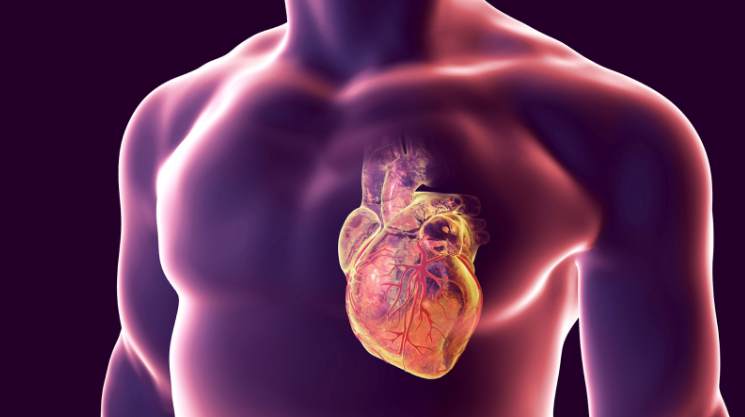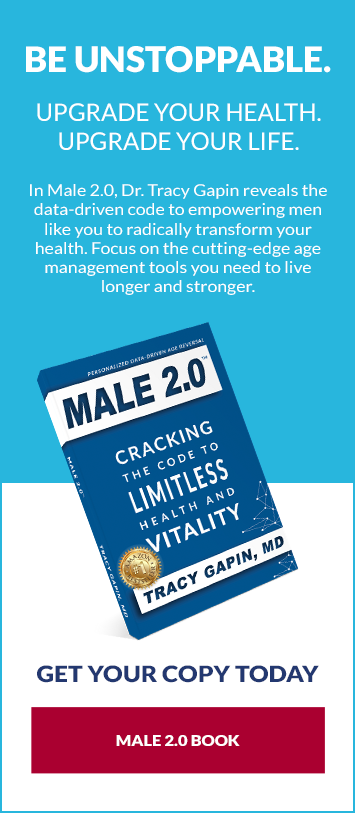
When we think about erectile dysfunction (ED), we’re mainly concerned about the impact it has on our sexual relationships. It’s an emotionally stressful situation and for most patients, the faster it can be fixed, the better.
However, our erections – or lack thereof – could be a measuring stick (no pun intended) of our overall health. Today, the problem is more common than ever. Researchers estimate that erectile dysfunction affects over 30 million American men. The worldwide figures may go as high as 322 million by 2025.
To meet these demands, there are now hundreds of therapies, supplements, on-demand prescription services, and much more. These options, while helpful at times, only paper over the cracks of what could possibly be a shaky foundation.
Most men with erectile dysfunction have an underlying condition that must be addressed. In short, ED is a warning sign of a potentially chronic issue, often involving circulation. If we could address this issue, we would not only provide a long-term solution to ED but help you live a longer, healthier life.
Here’s what happens when you get an erection

So what is erectile dysfunction?
ED is defined as an inability for a man to develop or maintain an erection sufficient for intercourse. To understand ED, it’s important to understand what’s happening with your body when you have an erection. When we’re sexually aroused, our bodies go through a series of processes.
1. It starts with a chemical reaction
When we have a sexual thought or action, a series of chemicals and hormones spring into action. These chemicals help send signals from the brain to the nerves in the body and penis. One of these is chemicals is nitric oxide, a special neurotransmitter that triggers a series of enzymes to help the muscle cells in the penis to relax. Some studies also show that testosterone plays a small part in achieving an erection.
2. The chemical reaction triggers a physical reaction.
While the blood vessels are dilating, you’re going through physical reactions as well. Our heart rate increases, our blood pressure increases, and blood is ready to flow into the penis. Nitric oxide also helps relax the walls of the arteries in two chambers of the penis called the corpora cavernosa. Corpora cavernosa have sponge-like channels of muscle that contain nerves, blood vessels, and arteries. Since the walls are now relaxed, there is increased blood flow to the arteries, blood vessels, and chambers.
3. Keeping blood in and out.
The blood in these channels helps the penis become larger and erect. To maintain the erection, the veins on the outside of the corpora cavernosa must close to prevent venous outflow. The pressure from the blood flow in these channels compresses the veins so the blood will not flow out of the penis. The increased pressure and decreased blood loss help to keep the erection. During this time, (until ejaculation or you’re no longer sexually stimulated) the body periodically releases nitric oxide to maintain the erection.
Of course, there are a range of psychological issues that cause ED including stress, depression, and performance anxiety. However, now that we have an idea of how the penis works, we can see how ED and blood flow are closely related. When you think about it, the penis is the only appendage on the body that can immediately tell us if our blood flow is up to par.
Erectile dysfunction then should not only be seen as a condition but a symptom of a possible disease.
ED and Heart Disease

Heart disease refers to any disorder that affects the cardiovascular system. These can include heart failure, arrhythmia, or heart defects. Most cases are due to atherosclerosis, which is the buildup of plaque in the blood vessels. This buildup limits blood flow to the heart and the rest of the body. The buildup of plaque in the arteries of the penis makes them harder to dilate.
Studies show that up to 57% of men with ED have some form of heart disease.
The arteries in the penis are some of the smallest in the body, about 1-2 mm in diameter. Some of the major arteries in the body are much larger, so we may not notice when there’s a blockage, blood vessel damage, or an issue with blood flow in these larger channels. However, in a smaller channel like the arteries of the penis, we can see a difference. This reason is why ED is a warning sign of heart disease.
ED and High Blood Pressure
Hypertension, or abnormally high blood pressure, happens when the force of blood flow against the walls of the blood vessels is too high. Blood is constantly circulating through our arteries and veins via the heart. It must be at a suitable level for healthy function. High blood pressure can put unnecessary strain on the heart muscles and eventually lead to heart disease.
High blood pressure can happen for years unchecked. Over time, hypertension can begin to wear on the walls of the arteries. When you add plaque buildup due to high cholesterol, blood pressure can cause more damage. The blood vessel damage is more evident in smaller channels like those in the penis.
Hypertension also causes wear and tear of the cells responsible for creating nitric oxide. Nitric oxide activates the relaxation of the muscle tissue in the channels of the penis. This process allows blood to flow through the arteries and tissue to create an erection.
In a study of close to 4000 men with hypertension, 67% were seen to have erectile dysfunction.
We’re beginning to see a pattern.
The penis could be considered an extension of the cardiovascular system.
Prediabetes or diabetes is linked to ED
Diabetes is one of the most dangerous diseases men face today. It can also go unchecked and patients with ED are often diagnosed with the condition. Over time, diabetes increases the risk of heart, nerve, kidney, and eye diseases. Even prediabetes can reduce the frequency of erections.
The excess sugar creates glucose deposits in the tiny arteries in the penis that lead to the smaller capillaries. Rendering the arteries unable to dilate and carry the necessary blood flow to the penis. This excess buildup also impacts the smaller capillaries in the penis. Over time, the tissue, muscle cells, and nerve endings can begin to die due to a lack of blood and oxygen. High blood sugar also reduces the production of nitric oxide, a common symptom of men with diabetes
Hormone deficiencies like testosterone
There is a reason testosterone is low on the list of warning signs.
Most men think their ED is a testosterone problem and would try different supplements and treatments to handle it discreetly.
But here’s a little secret:
It is possible for men to have low testosterone levels and still achieve healthy erections. On the other hand, men with healthy testosterone levels can have ED.
This tells us that ED is a far more complicated situation than low testosterone levels.
However, there are cases where low T-levels can contribute to ED. Testosterone helps overall sex drive, vitality, energy, and body composition. A lack of these can reduce the interest in sex or contribute to depression, which in turn reduces erections. Testosterone may also help with nitric oxide production, essential for maintaining an erection.
If you have ED, along with some other signs of low T (fatigue, weakness, loss of sex drive, and so on), we consider it a strong warning sign that testosterone could be lower than ideal. However, if ED is the only symptom, the cause is likely something else.
Addressing your health first
When I’m having a consultation with my patients, my immediate concern is finding out about overall health. ED often tells me there is an underlying problem and we need to use a system’s based approach to diagnose and treat the issue.
I’d first want to find out how long you’ve had ED and what you’ve tried in the past. My questioning would also surround gauging your T-levels. However, if you have seen worsening erectile function over time, ED is likely a warning sign of something greater. Here are some other critical questions:
- Have you experienced chest pain, high heart rate, or skipped heartbeats?
- Do you have shortness of breath or fatigue?
- Do you have chronic back and neck pain?
- What about vision problems or constant headaches?
- When was the last time you had an Annual Wellness Check or visit with a cardiologist?
- What’s your diet and exercise regimen?
From there, additional tests unrelated to your manhood may come as a surprise, but as we’ve outlined, there could be a chronic disease at play.
- We would recommend a blood test to check for STIs, testosterone levels, lipids and glucose levels. High glucose levels may indicate prediabetes or diabetes.
- A special ultrasound or CT can check for atherosclerosis or other possible heart diseases. A recommendation to a cardiologist may be best.
- A neurological assessment can give us insight into your nervous system. Since the nervous system helps with the processing of chemicals and signals to the penis, any problems here could spell problems with erections. Neurological problems can also signal conditions like diabetes.
- High blood pressure readings can also be indicative of conditions leading to ED.
Now we have zoomed out with a full idea of your overall health.
With that information, we can treat the underlying cause of ED. This may require the coordination of other doctors and other treatments.
I have found that lifestyle changes are one of the best ways to get some of these conditions under control if they are caught early.
Making holistic changes like maintaining a healthy weight, changing your diet, sufficient sleep, and reducing stress can help manage these symptoms. Also, consider avoiding environmental toxins and endocrine disruptors like plastics that can wreak havoc with hormone production.
Studies in epigenetics suggest that we can even change our bodies on a genetic level by focusing on healthy habits, and lifestyle modifications. We can reprogram the genes that have been passed onto us that may be contributing to lifestyle diseases.
Building a team of people who could help you improve in these areas (a dietician, a fitness coach, and yes, your trusty urologist) can do much more than trying to go it alone.
Treating your ED
If a significant change in your health or addressing the underlying issues still has not improved your ED, we can now move on to treating the issue. We’ve seen fantastic success rates with the therapies in our arsenal. These include:
Peptide therapy
Your body produces countless peptides every day. These are the precursors to and building blocks of proteins. Scientists have discovered that there are some 7000 peptides created in the body. Some of these provide anti-inflammatory, muscle-enhancing, and vitality properties. Peptide production varies by person and can decline with age or certain medical conditions. The reduction in peptides can impact physical health, metabolism, and even sexual health.
Certain peptides when administered can treat or even reverse some conditions. For example, the PT-141 peptide can significantly improve erectile function. Peptide therapy works best via injections, but there are oral and topical options. Some over-the-counter supplements contain peptides, but not with the degree of potency and accuracy that’s possible through your doctor. Peptide therapy may be an effective treatment option for a myriad of issues beyond erectile function.
Stem-cell therapy and PRP
Our bodies contain raw materials that can be converted into the cells, tissues, and even organs we need to function. By harnessing the power of these properties, we can heal and even restore damaged parts of your body. Platelet-Rich Plasma (PRP) is one form of treatment that separates healthy plasma from our own blood to stimulate healthy cell growth and repair in the penis. Stem cell therapy is a similar treatment, except we harvest pluripotent cells from your bone marrow.
Stem cell therapy or PRP start with extracting blood, fat, or bone marrow from the body. The sample is placed in a centrifuge to separate the blood from the powerful cells or plasma. The plasma is then injected into the problem areas over several sessions. Both therapies can help with improving erections and the overall health of your penis.
Testosterone Replacement Therapy (TRT)
TRT is a popular solution for men with abnormally low T levels. If these levels are causing ED, we can provide topical, or injectable forms of testosterone.
Of course, TRT has both risks and benefits. We will discuss if the treatment is right for you.
GAINSWave
Can the power of sound help reverse erectile dysfunction? GainsWave is the new “wave” in ED treatment. Even the tiny blood vessels in the penis contain plaque, preventing maximum blood flow.
The GainsWave device uses high-frequency acoustic sound waves to break up the plaque and expand damaged blood vessels. This also stimulates new blood vessel growth, called angiogenesis. The concept is similar to muscle growth due to exercise. For instance, when we lift weights, we create microtrauma in the targeted muscle. The muscle responds with new cell growth to increase strength and size.
GainsWave creates microtrauma in the blood vessels of the penis. The body responds with growth factors that help repair and create new blood vessels. The treatment can take up to 30 minutes and patients experience harder, longer-lasting erections after one session. For long-term results, some patients will require several sessions as part of an ongoing therapy plan. GainsWave is popular since it’s non-invasive, drug-free, and has no side effects. The therapy can also be combined with other treatments for maximum results.
The Bottom Line
Erectile dysfunction should not be looked at or treated in a vacuum. In almost all cases, ED is a symptom of a severe, underlying condition. It is often a sign of our cardiovascular health. Most studies link ED to hypertension, heart disease, and high cholesterol. There’s also the possibility of other lifestyle diseases like diabetes.
We’re committed to not only improving your sexual health but your overall health. That means taking a closer look at what’s happening with your body and applying the necessary lifestyle changes.
Schedule a consultation today. With the necessary lifestyle changes, disease treatment, and, if necessary, ED treatment, you’ll be healthier and happier.




